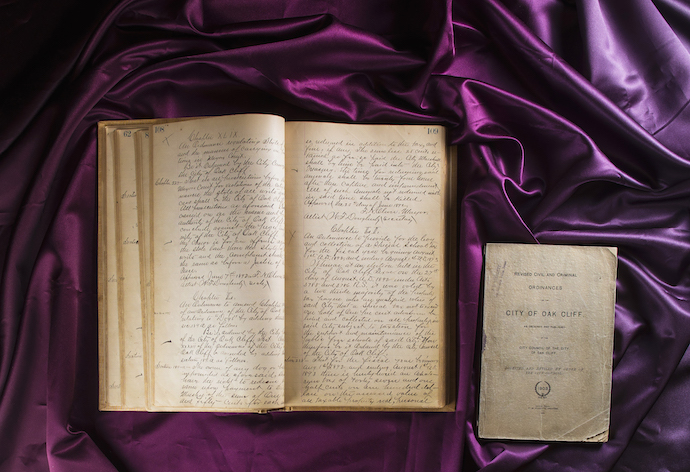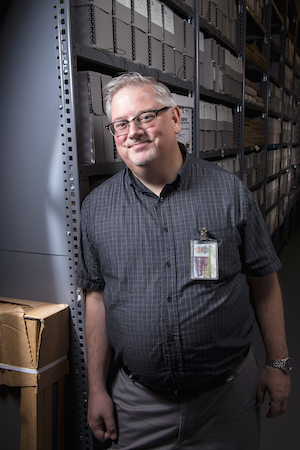
Photo by: Danny Fulgencio
Dallas’ city archivist grew up in Austin, spending much of his youth on the University of Texas campus. John Slate’s mother was an associate dean, his father an English professor for 45 years. Slate, perhaps as a result, is a self-proclaimed “lifelong culture nerd.” As a high school student during the tail end of the punk era, Slate launched a fanzine. Using the pseudonym Control Rat X, the young publisher and writer specialized in music criticism. Despite a trajectory that parallels the early career of Cameron Crowe (a comparison he insists is ridiculously exaggerated), Slate never became a reporter for Rolling Stone (he rolls his eyes at the thought; it was too mainstream), and despite his degree in radio/TV/film, he did not become a moviemaker, either. That’s not to say he isn’t a diehard movie buff. He is — simply one drawn to a quieter, less cutthroat industry. He prefers his profession underground, literally, surrounded by historical treasures — documents and images with stories to tell — cataloguing, preserving and protecting the past. One of the best at what he does, Slate recently was elected by his peers as a fellow of the Chicago-based Society of American Archivists, which is kind of like getting an Oscar, for archiving.
Seems you could have gone into music journalism or filmmaking, so why did you choose to pursue library and information sciences with a concentration in archival enterprise, which, to be honest, sounds slightly less, um, cool?

Photo by: Danny Fulgencio
Oh no. The answer to that is easy. I love history. Truth is stranger fiction or someone else’s interpretation of the truth. In the archives, you have direct access to the documents, the images and the roots of some of the craziest, often untold, stories. Working around primary sources is so much more interesting. Also the journalism programs and, of course, the film programs at UT were highly competitive and selective. The film program at UT is heralded, but but I just couldn’t see myself working in the film, TV, or journalism industry. I instantly took a liking to archives. While working in the UT archives, author James A. Michener had a temporary office in our building while he was doing his research for “Texas.” I delivered books to his office regularly. I met many writers and historians in my years there.
Share an interesting untold story from the archives.
Well, for example, we knew Sam Houston was married several times and had marital troubles, but why? There are hints in some of the letters between Sam and his last wife. Turns out in the Creek Indian War he got an arrow in his groin and the wound never quite healed. Eww. Now that might put a strain on a marriage.
I’m sorry for saying it wasn’t cool — beginning to see things differently. Now can you tell us more about this magazine you started when you were a teenager?
My budding journalism career, yes, this started just before the Austin Chronicle. The only music reporting was the Austin American Statesman and it was pretty sanitized. My fanzine, Xiphoid Process, was Xeroxed and stapled; one side effect was that it did get me into clubs underage so I could cover the bands. Note: He donated a set to Texas State University library.
Did you ever seek advice from Lester Bangs, like the kid in “Almost Famous”?
Actually I did meet Lester in Austin. He guest edited an issue.
What? Are you kidding? I was kidding.
No he did. I mean we weren’t best friends or anything, but he liked talking to people, especially about music history. He was so, so nice to me. I published one of his poems.
What’s the best punk band you covered?
I’d say both Black Flag and Minor Threat. They both gave great interviews.
You did not ultimately become a journalist, but you’ve written a lot, right?
I do write. I’ve published articles on archives, photography, music, Texas history, author or co-author on multiple Arcadia Images of America series books including “Historic Dallas Parks,” “Lost Austin,” “Dealey Plaza” and “John F. Kennedy Sites in Dallas-Fort Worth.” And co-authored, with Kaye Lannin Minchew, “Managing Local Government Archives.” That last one makes “Gone With the Wind” look like a comic book [chuckle].
Will you maybe make a documentary sometime?
I am an extreme movie lover and really interested in how films are made. My father taught the adaptation of books to film. But making movies is — I’ve watched friends I know in the industry — it is so difficult in so many ways. But, who knows?
What was the most influential film of your youth, the one that made you appreciate the craft?
Oh, “Aguirre, the Wrath of God” by Werner Herzog. It’s one of the most visually arresting … I could watch it over and over.
You recently moved to Lake Highlands, which is really different from where you lived, Oak Cliff, historically speaking, for one thing …
Yes, we are near the Merriman Park area. I like the diversity of Lake Highlands, and I like that you see that in the schools — I have twins who will be in school in a few years. As for its history, I have not dug into Lake Highlands much yet. It’s definitely on my list.
We will check back with you once you have.
Questions and answers have been edited for brevity and clarity.
SaveSave





